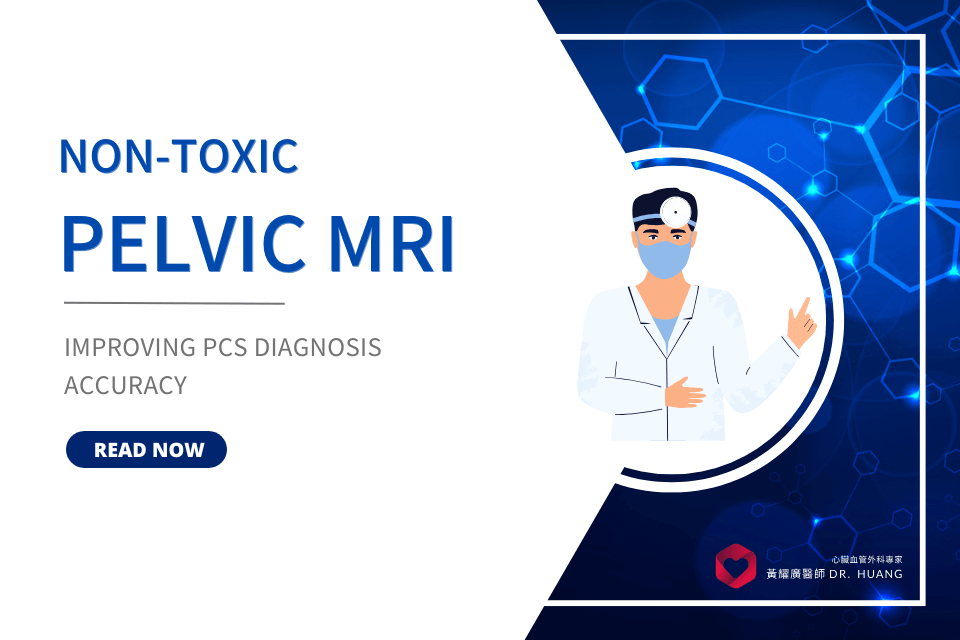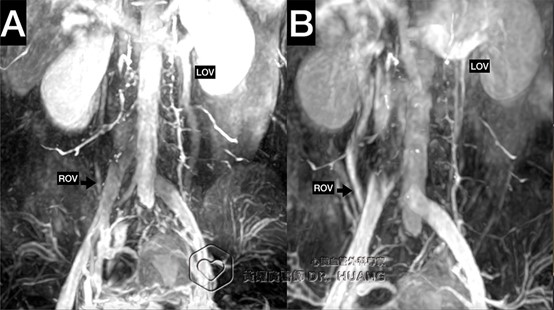
Non-Toxic Pelvic MRI: Improving PCS Diagnosis Accuracy
Non-Toxic Pelvic MRI: Improving PCS Diagnosis Accuracy
Pelvic Congestion Syndrome (PCS) is a less commonly discussed condition, and its causes generally include the following four factors:
➤ Venous Insufficiency
One of the most common causes is impaired blood flow in the pelvic veins, leading to varicose veins.
This may be due to vein wall dysfunction, blood reflux, or increased venous pressure.
➤ Pregnancy
Increased pressure on the uterus and pelvic venous plexus can lead to varicose veins and pelvic congestion syndrome.
➤ Genetic Factors
Some individuals may have a genetic predisposition, making them more susceptible to developing pelvic congestion syndrome.
➤ Other Factors
Additional factors include hormonal changes, chronic inflammation, obesity, tumors, prolonged standing or sitting, and lack of physical activity.
➤ Symptoms of Pelvic Congestion Syndrome (PCS)
The symptoms of Pelvic Congestion Syndrome can vary from person to person. Below are some possible symptoms:
- Pelvic Pain: One of the most common symptoms, which can be chronic, dull, or intermittent sharp pain in the pelvic or lower abdomen.
- Fatigue: Many patients report feeling tired, weak, and physically drained.
- Abnormal Bleeding: Some patients may experience irregular vaginal bleeding, particularly during menstruation or after intercourse.
- Lower Back Pain: Patients may report pain in the lower back or sacral area.
- Localized Tenderness: Patients may experience tenderness or discomfort in the pelvic region, with the left side being more commonly affected than the right.
- Sexual Dysfunction: Some women may report a decrease in sexual desire or dysfunction.
They may also experience lower abdominal discomfort or aching after sexual activity.
Quick Overview of Non-Toxic Pelvic MRI
What is Pelvic MRI?
Pelvic MRI uses a powerful magnetic field and electromagnetic effects to create high-resolution images, helping doctors examine and assess the organs, tissues, blood vessels, and other abnormalities in the pelvic area.
During a pelvic MRI scan, the patient lies on a special examination table and enters a large circular MRI machine.
The machine generates a strong magnetic field and harmless radiofrequency pulses, which stimulate the body's tissues to emit specific signals.
These signals are then received by a receiver and converted into high-resolution images.
Indications for Pelvic MRI:
- Assessment of uterine or ovarian tumors
- Gynecological issues, such as endometriosis or uterine fibroids
- Prostate exams, including prostate cancer assessment
- Evaluation of causes of pelvic pain
- Detection of organ, tissue, or vascular abnormalities, infections, inflammation, trauma, and congenital defects in the pelvic area
The cost of pelvic MRI can vary depending on the region, clinic, and healthcare provider.
For accurate pricing, it’s best to contact the medical facility offering the service.
Get Expert Cardiovascular Advice Now
Expert Surgeons for Comprehensive Cardiovascular Treatment!
Instant Online Consultation Available
Why is Pelvic MRI Preferred for Pelvic Imaging?
The diagnosis and evaluation of Pelvic Congestion Syndrome (PCS) typically require imaging to help doctors determine the location, extent, and severity of the abnormalities.
In the imaging assessment of PCS, our developed Non-Toxic Full Venous MRI is often the preferred choice for the following reasons:
➤ Detailed Anatomy
The excellent anatomical detail allows for clear visualization of various tissues and organs within the pelvic area, including the uterus, ovaries, fallopian tubes, and blood vessels.
This is crucial for evaluating pelvic varices and other potential abnormalities.
➤ Blood Flow Assessment
Non-Toxic Full Venous MRI provides dynamic analysis, such as blood flow assessment.
This is particularly useful for evaluating venous congestion and blood reflux, which are key concerns in the venous system.
Pelvic CT vs. Pelvic MRI
➤ Non-Toxic Pelvic MRI
The MRI pelvic examination process does not involve radiation or contrast agents.
Compared to other imaging methods like CT scans, MRI does not use X-rays or other forms of radiation.
This makes it safer for evaluating gynecological conditions, especially for patients who may need repeated examinations, and is particularly suitable for younger women who are still of reproductive age.
➤ Pelvic Computed Tomography (CT)
Pelvic CT scans still play a role in diagnosing Pelvic Congestion Syndrome (PCS):
- If patients can't undergo Non-Toxic Full Venous MRI, a CT scan may be the only option for analyzing pelvic issues.
- CT scans offer excellent resolution for viewing bone structures, calcifications, and volume lesions.
- Certain medical devices (e.g., old bone screws) may interfere with Non-Toxic Full Venous MRI, making CT the only option for imaging.
Get Expert Cardiovascular Advice Now
Expert Surgeons for Comprehensive Cardiovascular Treatment!
Instant Online Consultation Available
4 Pelvic Imaging Methods: What Doctors Recommend
To evaluate and diagnose pelvic-related diseases and conditions, doctors use various imaging tests.
In addition to the previously mentioned pelvic MRI and CT scans, pelvic ultrasound and angiography are also commonly used.
➤ Pelvic Ultrasound
- Imaging Principle: Utilizes ultrasound technology to emit and receive sound waves to generate images.
- Purpose: Patients often ask what pelvic ultrasound can detect.
It is primarily used to examine organs such as the ovaries and uterus for abnormalities like endometrial cancer, uterine fibroids, endometrial thickening, ovarian cancer, and ovarian cysts. - Duration: About 15-30 minutes.
➤ Angiography
- Imaging Principle: A venous catheter is placed on the affected side, and a contrast agent is injected to visualize the veins.
- Purpose: Commonly used for diagnosing venous-related issues, such as the expansion of narrowed veins, administering drugs to dissolve venous thrombosis, or placing inferior vena cava filters to prevent pulmonary embolism.
- Duration: About 30 minutes.
| Test Method | Non-Toxic Full Venography | CT Scan with Contrast | Ultrasound (Transvaginal) | Venography with Intravascular Ultrasound |
| Pelvic Anatomy | Best (especially soft tissue and vessels) | Second best (calcium and bone structures visible) | Localized, no vascular info | No pelvic info beyond vessels |
| Invasiveness | None | None | None | Yes |
| Radiation Toxicity | None | Yes | None | Yes |
| Cost | Medium | Low | Low | Extremely high |
| Blood Flow Dynamics | Best | None | Second best | Single location |
| Objectivity | Yes | Yes | No | No |
| When to Use | Pre-surgery assessment, post-surgery follow-up | Pre-surgery assessment, post-surgery follow-up | Pre-surgery screening | Intraoperative evaluation |
Pelvic Imaging and Treatment: All-in-One Solution

At Chiayi Chang Gung Memorial Hospital, Dr. Huang and Dr. Chien-Wei Chen collaborated to develop the patented Non-Toxic Full Venous MRI.
For referred patients, the Non-Toxic Full Venous MRI is used to assess overall pelvic blood flow, followed by discussions of interventional or pharmacological treatment options.
If discomfort persists after treatment, the Non-Toxic Full Venous MRI will be used again to assess the healing progress.
We welcome patients and physicians with relevant needs to contact us.


